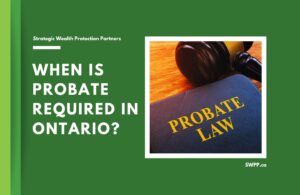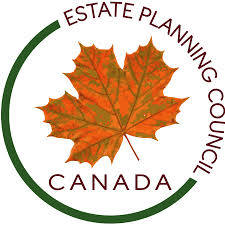Written by Ron Cooke, President & Founder of Strategic Wealth Protection Partners in Ontario, CEA®, Member of the Estate Planning Council Canada
Wills for Blended Families in Canada
If you’re looking into wills for blended families Canada, you likely want clarity on how to fairly and effectively provide for everyone you care about.
When creating a will for blended families, careful planning is required to ensure your wishes are very clearly documented and legally enforceable. It’s important to balance the needs of your current spouse with those of children from previous relationships.
Without a well-structured will, default inheritance laws may leave some family members unintentionally excluded.
Consider using trusts to provide ongoing support for your spouse while preserving assets for your children. Be clear about who receives what and when, and update your will after marriage, divorce, or the birth of children. Working with an estate planning professional can help avoid future conflict and legal challenges.

Table of Contents
- Key Things to Know About Wills for Blended Families in Canada
- Understanding Estate Planning for Blended Families
- Key Challenges in Blended Family Inheritance
- Common Mistakes in Estate Planning for Blended Families
- Choosing the Right Type of Will
- Balancing Assets Between Your Spouse and Children
- The Role of Trusts in Protecting Your Family
- How Beneficiary Designations Impact Your Estate Plan
- Life Insurance as an Estate Planning Tool for Blended Families
- Tax and Probate Considerations for Blended Families
- Final Steps for a Strong Estate Plan
- Common Questions
Key Things to Know About Wills for Blended Families in Canada
- In blended family situations, it’s essential to plan your will carefully to protect both your surviving spouse and your own children.
- Without a clear will, remaining assets (everything left in a person’s estate after all debts, taxes, specific gifts, and expenses have been paid or distributed) may not be distributed as intended after a spouse dies.
- Consider how your assets will be handled upon your surviving spouse’s death—they may not automatically go to your own family.
- Assets like registered retirement savings plans (RRSPs) and tax-free savings accounts (TFSAs) should have updated beneficiary designations to reflect current family members.
- A marriage contract can help clarify rights to family property and protect inheritances in complex family relationships.
- Leaving everything to a surviving spouse can unintentionally disinherit your own children if no safeguards are in place.
- Joint planning and open communication are key to preserving family harmony and avoiding conflict after a spouse passes.
- A carefully structured will and possibly a trust can ease estate administration and ensure fair treatment of all family members.

Understanding Estate Planning for Blended Families
Estate planning in blended families is especially sensitive because your children’s inheritance could unintentionally end up in someone else’s hands.
If you leave everything to your new spouse without safeguards, there’s no legal obligation for them to pass any assets on to your children from a previous relationship. This often leads to situations where the deceased’s children receive nothing, especially if the surviving spouse remarries, rewrites their will, or is influenced by other family dynamics.
To prevent this outcome, it’s essential to use trusts, clear wills, and legally binding instructions to protect your children’s share.
You need a plan that respects your new family while safeguarding your legacy for the children you’ve always loved and raised.

Key Challenges in Blended Family Inheritance
Blended families often face emotional and financial tension when it comes to inheritance.
One of the biggest challenges is balancing competing obligations—wanting to provide for a current spouse while also protecting children from a previous relationship. Without clear legal planning, this can lead to conflicts, resentment, or legal battles among heirs who feel overlooked or unfairly treated.
Fairness doesn’t always mean equal distribution.
It means honouring intentions with clarity and compassion, using tools like trusts or life insurance to balance competing needs. Open communication and a solid estate plan are critical to keeping the family united and your legacy intact.
Common Mistakes in Estate Planning for Blended Families
One of the most common—and costly—mistakes is leaving an outdated will in place that no longer reflects your current family situation.
Others include giving unclear instructions, failing to name specific beneficiaries, or assuming your spouse will “do the right thing” without legally binding direction. Many families also overlook how changing dynamics, like remarriage or estrangement, can drastically alter inheritance outcomes if not planned for.
Best practices include updating your will regularly, using trusts to protect children’s inheritance, and having open discussions with your family to avoid surprises. Professional guidance ensures your estate plan reflects both your values and your new reality.
Speak with an estate planning professional to find out if a trust is right for your family.
Choosing the Right Type of Will
In Ontario, your will must comply with strict provincial rules under the Succession Law Reform Act to be valid and enforceable.
If you have a blended family, choosing the right type of will is one of the most important gifts you can leave behind. The wrong will—or no will—can lead to family disputes, expensive probate fees, estate taxes, and delays that rob your loved ones of peace.
Here’s a breakdown of the three main types used in Ontario:
- Mirror Wills: These are two nearly identical wills made by spouses, usually leaving everything to each other, and then to their children. While common, they do not bind the surviving spouse, who can change their will at any time after the first death. This can be risky in blended family situations where fairness is critical.
- Mutual Wills: A rare but powerful legal arrangement in Ontario. Mutual wills include a binding agreement that neither spouse will change their will after one dies, providing added security for children from previous relationships. However, they must be carefully drafted with legal advice, as Ontario courts require clear evidence of the agreement.
- Joint Wills: These are outdated and rarely recommended in Ontario. A joint will is a single document for two people, which becomes irrevocable after one dies. They are inflexible, difficult to update, and can create unintended legal consequences.
Every family is different—and in a province like Ontario, where estate law is detailed and evolving, the “one-size-fits-all” approach can leave your estate exposed. Don’t risk your legacy to chance or chaos.
Balancing Assets Between Your Spouse and Children
In Ontario, balancing your estate between your spouse and your children—especially in blended families—requires care, clarity, and legal precision.
Without a well-structured plan, even the most loving families can fall into conflict, legal disputes, or emotional estrangement. One effective approach is using a spousal trust, which ensures your spouse is financially supported during their lifetime while preserving the capital for your children later on.
Other strategies include designating assets like life insurance or registered accounts directly to children, or adjusting inheritances based on lifetime gifts to ensure what’s truly fair. The key is to create a plan that reflects your heart, honours your relationships, and brings peace long after you’re gone.
The Role of Trusts in Protecting Your Family
Trusts are among the most powerful and flexible tools in Ontario estate planning—especially for blended families, where priorities must be carefully balanced.
A properly drafted spousal trust can ensure your surviving spouse is cared for, while protecting the capital for your children after their passing, avoiding costly disputes and emotional fallout.
Other types of trusts, like testamentary or discretionary family trusts, allow you to control how and when your assets are used, shielding them from creditors, lawsuits, and even poor financial choices by beneficiaries. These structures also reduce probate fees, limit exposure to estate taxes, and help your wishes unfold exactly as intended.
This is about more than money—it’s about security, love, and clarity.
Take the first step and book your planning session today.

How Beneficiary Designations Impact Your Estate Plan
In Ontario, beneficiary designations on registered accounts and life insurance policies have the legal power to override the instructions in your will.
That means even if your will says one thing, your RRSPs, TFSAs, or life insurance proceeds may go directly to the named beneficiary—regardless of your broader estate intentions. This can unintentionally disinherit children or create unfair outcomes, especially in blended families where emotions and expectations are already complex.
It’s essential to review and update your designations to ensure they align with your estate plan, especially when life changes—like marriage, divorce, or the birth of children—occur.
This is where planning becomes protection. One overlooked form can undo everything you’ve built. Let’s make sure your entire plan speaks the same language: love, fairness, and clarity.
Life Insurance as an Estate Planning Tool for Blended Families
In blended families, life insurance is one of the most powerful and compassionate tools you can use to provide financial security and balance competing interests.
It allows you to support your spouse with one stream of assets—perhaps through your will or a spousal trust—while using life insurance proceeds to provide an equal or equitable inheritance to your children, without triggering probate fees or delays. This can prevent conflict, eliminate confusion, and ensure no one feels left behind.
Properly structured, life insurance offers tax-efficient liquidity, helping to settle taxes or debts without forcing the sale of cherished family assets like a home or cottage.
You don’t have to choose between the people you love. You just have to plan wisely.
Tax and Probate Considerations for Blended Families
In Ontario, estate taxes and probate fees can quietly erode your legacy if not planned for properly.
This is especially true in blended families, where multiple heirs and competing interests make things more complex. Probate fees (formally known as the Estate Administration Tax) are calculated on the total value of your estate and can significantly reduce what your loved ones ultimately receive.
Capital gains taxes on real estate, investments, and certain registered accounts can also trigger large, unexpected liabilities at death.
Without careful planning, this financial burden often falls unevenly—causing tension, unfairness, or even the forced sale of important family assets.
To reduce these costs, at SWPP, we use proven strategies like joint ownership with right of survivorship (when appropriate), multiple wills, trusts, and tax-efficient life insurance plans to keep more of your wealth in your family’s hands—not the government’s.
Final Steps for a Strong Estate Plan
A well-crafted estate plan isn’t just a legal document—it’s a final love letter to your family.
For blended families especially, the details matter. From choosing the right type of will, to aligning beneficiary designations, balancing inheritances, using trusts, and reducing taxes and probate fees—each decision must work together to form a clear, fair, and legally sound plan.
But here’s the truth: you can’t afford to leave this to chance, outdated documents, or DIY kits.
The next step is simple.
Book a confidential estate planning consultation with SWPP.
Together, we’ll build a plan that protects your family and honours your wishes.

Common Questions
Do stepchildren have inheritance rights in Canada?
Stepchildren do not automatically have inheritance rights under Canadian law unless they are legally adopted. To ensure they are included, you must name them specifically in your will or trust.
How do you divide assets in a blended family in Canada?
Assets in a blended family are best divided through a customized estate plan using tools like spousal trusts, life insurance, and clearly structured wills. This ensures fairness while minimizing conflict and meeting both spousal and children’s needs.
What is the best estate planning strategy for a second marriage?
The most effective strategy often includes a combination of spousal trusts, mutual wills, and life insurance to protect both the new spouse and children from the first marriage. It’s essential to work with a professional to balance legal, tax, and emotional considerations.
Are there tax advantages to using a spousal trust in Canada?
Yes, a spousal trust can defer capital gains taxes until the surviving spouse passes away, which helps preserve the estate’s value. It also provides income to the spouse while protecting the inheritance for children.
Key Takeaways:
- The best estate plans are proactive, personal, and professionally guided.
- Blended families need customized estate plans to balance the needs of spouses and children while avoiding conflict and legal pitfalls.
- Wills, trusts, and beneficiary designations must work together to ensure your wishes are clearly and legally carried out.
- Spousal trusts and life insurance are powerful tools to protect your loved ones, reduce taxes, and fairly distribute assets.
- Probate fees and estate taxes in Ontario can significantly reduce your legacy without proper planning and professional guidance.
A Will Isn’t Enough to Protect Your Family’s Inheritance
Writing a will is a crucial step, but it’s just the beginning.
A will only states who gets what, but it doesn’t help you minimize estate taxes, avoid probate fees, or prevent legal delays.
In Ontario, probate fees (Estate Administration Tax) and capital gains taxes on properties can take a significant portion of your estate. If you own multiple properties, the financial burden could be even greater, forcing your loved ones to sell assets just to cover unexpected costs.
Without proper estate planning, your family could receive far less than you intended. The good news? There are strategies to protect your wealth—but they must be set up before it’s too late.
Keep Your Wealth in the Family with Proper Planning
A well-structured estate plan does more than just pass on your assets—it ensures your wealth stays in the family.
By using tools like trusts, life insurance, and gifting strategies, you can:
✅ Reduce or eliminate probate fees
✅ Minimize capital gains taxes on real estate
✅ Prevent legal disputes and family conflicts
Without these safeguards, your loved ones may face delays, unnecessary legal battles, and financial strain. A strong estate plan gives you peace of mind, knowing that your family will be cared for and your legacy will be protected exactly as you intended.
Schedule a Living Estate Plan Consultation
Planning your legacy is about more than numbers—it’s about ensuring your family remembers you and your values are honoured for many years to come.
Estate planning and trusts can feel overwhelming, especially if it’s your first time. That’s why we’re here.
With our simple, 5-Step Living Estate Plan, we make the process easy, helping you create a comprehensive estate plan or trust that protects your assets from taxes and probate fees while preserving your legacy. Tools like The Final Word Journal capture your story, wishes, and essential details like accounts and end-of-life plans, ensuring your family has clarity and comfort.
Take the first step today—schedule a consultation call and give your family the ultimate gift: peace of mind and the assurance they were always your priority.
Read More
If you’re writing a will, you may find these articles helpful:
- Is a Living Trust Better than a Will in Canada?
- Living Will Ontario: What It Is and How It Works
- What Are the Types of Wills in Ontario?
About the Author
RON COOKE, PRESIDENT & FOUNDER OF STRATEGIC WEALTH PROTECTION PARTNERS

With over 30 years in financial services, I’ve seen the challenges families face when a loved one passes—lost assets, unnecessary taxes, and emotional stress. That’s why I created the Living Estate Plan, a comprehensive process to protect assets, eliminate estate and probate fees, and create legacies that are remembered for many years to come.
This plan ensures your family receives not just your wealth, but a meaningful reminder of your care and love. Tools like The Final Word Journal capture your story, wishes, and essential details, offering clarity and comfort during difficult times.
Your final gift should be more than money—it should be peace of mind, cherished memories, and an organized estate.
Schedule a Call
Schedule a 30-minute consultation call with Strategic Wealth Protection Partners.
Click HERE to schedule a consultation.









